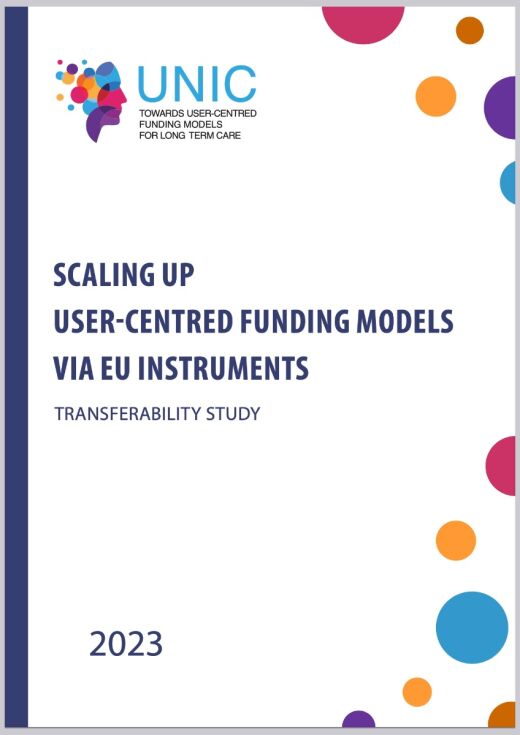The final UNIC report explores how to build and sustain personal budgets reforms and use EU structures.
The UNIC report was a critical 3 year project, funded by the EU, to establish a clear pathway for public authorities to adopt personal budget policies. This report is the third and final report of the project and it sets out ways in which public authorities can innovate and use EU funding and structures to make further progress. The UNIC Project also produced an ICT tool to enable evaluation of personal budgets and the supporting services and systems.
From the Executive Summary:
"The UNIC project is focused on providing support to public authorities developing user-centred funding models in long-term care and support. The project also seeks to support providers in the development and delivery of services based on this model. User-centred funding models, such as personal budgets, are an innovative way of funding and they have been gaining interest by public authorities and various stakeholders around Europe. In this model, public authorities distribute an amount of money directly to the individuals with care and support needs, helping them actively organise their own care and support services. This leads to more autonomy in decision making, control over their own lives, and active
participation in the development of services."Among the key deliverables of the project there are a report on models of good practises in user-centred funding models, a roadmap with guidelines on how to implement personal budgets, a toolbox to support different stakeholder groups involved in personal budgets delivery (people who draw on care and support, service providers, and public authorities), and transferability guidelines. The present document, the UNIC transferability study, identifies drivers and barriers for scaling up the development of personal budgets through EU instruments. The document’s target audience is primarily stakeholders (public authorities, service providers, etc) interested in scaling up the personal budgets system to their own municipality, region, or country.
"It presents the key perspectives and findings of the UNIC project with regard to the transferability of the personal budgets system gathered through the initial piloting in Flanders, Belgium, and subsequent transferability efforts in multiple countries (Austria, Czechia, Finland, and Spain). These findings are then related to existing EU initiatives and funding programmes which can support the further scaling up and adoption of user-centred funding schemes. Finally, the document presents policy recommendations for key stakeholders."
Amongst the various recommendations this final recommendation is perhaps the most critical, ensuring that resources and change projects do not simply support older institutional models:
“EU funds should not be used for the development of outdated infrastructures, services and policies that can lead to the further segregation of people with care and support needs from the community. Even if the Multi-Annual Framework 2021-2027 cannot be used to fund or renovate residential institutions, there have been instances across different Member States where funds have been allocated for this purpose. For this reason, the European Expert Group on the transition from institutional to community-based care has developed an EU funds checklist to promote independent living and deinstitutionalisation. This checklist, together with UNIC’s outputs, will support Member States to design and implement reforms that will put persons with care and support needs at the centre of planning, giving them more choice and control over the care and support they receive, allowing them to meet their individualised needs, wishes and preferences and to choose the life they want to live. Among these reforms, those aimed at ensuring a user-centred way of organising and funding care and support are particularly crucial.”
Read and download the free pdfs in your browser, links below.

The UNIC project and its website have received financial support from the European Union Programme for Employment and Social Innovation “EaSI” (2014-2020).
The publisher is the UNIC Project EU. Scaling Up User-Centred Funding Models via EU Instruments © UNIC Project 2023.
Deinstitutionalisation, Inclusion, Personalised Support, Self-Directed Support, Europe, Paper